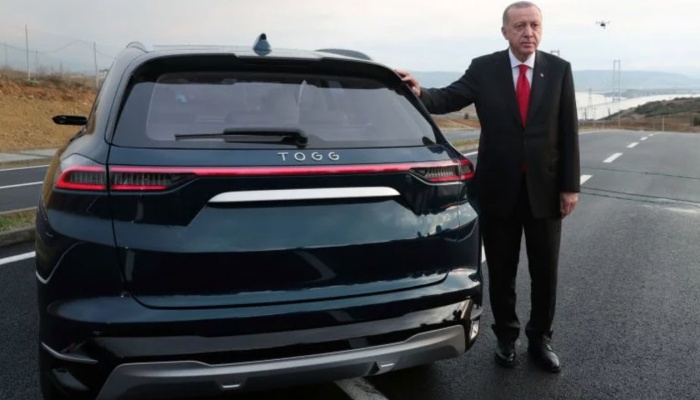On the shores of the Sea of Marmara, a grey and turquoise factory built at breakneck speed is churning out electric cars by the hundreds.
Turkey is hoping its first major electric carmaker will put the country in the driver’s seat of the automotive industry.
Inside the plant, robot arms weld the passenger compartment of its first SUV, the T10X, which launched last year. After painting, the parts are then sent for assembly, before finally passing through a luminescent tunnel to be scrutinized by workers for imperfections.
The batteries, made in partnership with Chinese manufacturer Farasis Energy, are assembled in a next-door building.
It takes an hour for the plant to produce 20 vehicles.
“Last year, we produced 20,000 vehicles without any loss. Tesla produced only 2,000 in their first year,” a production manager told AFP on condition of anonymity.
The manager also praised the plant’s “highly educated” workers, 40 percent of whom are women.
In half a century, the Marmara region around Istanbul has become one of the leading centers of the world’s automobile industry.
Major carmakers including Fiat and Renault opened plants there at the beginning of the 1970s, with others like Ford, Toyota and Hyundai following, taking advantage of Turkey’s position at the crossroads between Europe, Asia and the Middle East.
Car horn in outer space
“They initially invested to supply the local market, which for a long time was protected by tariffs,” independent consultant Levent Taylan told AFP.
But after the European Union-Turkey customs agreement came into force in 1995, opening the European market to cars made in Turkey, exports revved up.
“Today the Turkish automobile industry exports around 70 percent of its production to Western Europe,” Taylan said.
A vast network of 530 automotive subcontractors has also sprung up, employing more than 230,000 people, according to Albert Saydam, president of the Turkish Association of Automotive Parts and Components Manufacturers (TAYSAD).
“Most cars around the world have a part that is produced in Turkey. For example, the horn of [the] first car in space, the Tesla Roadster, was supplied from one of our members,” he told AFP.
In 2018 Tesla boss Elon Musk blasted a Roadster into space aboard a Falcon heavy rocket as a publicity stunt, with the car’s sound system set to play David Bowie’s hit “Space Oddity” on loop.
That same year Togg was founded as a joint venture between four Turkish companies and the country’s chamber of commerce to steer its car industry towards the electric future.
Market booming
“The project represents a significant milestone in Turkey’s automotive industry and symbolizes the country’s ambition to become a prominent player in the global electric vehicle market,” Saydam said.
President Recep Tayyip Erdogan has sought to make the carmaker a point of national pride, with the T10X model launched in March 2023 right before the country’s presidential election.
“We have not missed the boat on electric cars,” he said again in mid-May.
Nevertheless, Togg says the government’s support is limited to allowing it the free use of land for its seaside Gemlik factory and a commitment to purchase 500 vehicles a year.
Since its launch, the Togg T10X has taken nearly a third of electric car sales in Turkey, according to data from the Turkish Automotive Distributors Association (ODMD), with 19,583 vehicles sold in 2023.
And the market is booming. EV sales increased nine-fold there last year, making the Turkish market bigger than Italy and Spain’s.
Despite Togg’s hopes that the T10X will hit the road in Germany by the end of the year and in France next year, Taylan believes the company still has a long way to go.
The car “is considered to be expensive, and only about 25,000 models a year are being sold,” he said.
To have a chance of being profitable, a car plant would have to make at least “200,000 vehicles a year,” Taylan argued.
© Agence France-Presse

